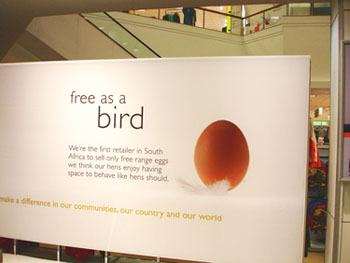For many years now, Woolworths – the major supermarket chain in South Africa – has included animal welfare among its corporate social responsibility (CSR) policies.
As early as the mid 1990s, they adopted an Animal Welfare Code of Practice approved by the National Council of Societies for the Protection of Animals (NSPCA). Among other things, the code said that all animals destined for Woolworths stores must be reared humanely and treated fairly, and that abattoirs must be regularly audited by a Woolworths technologist.
They also do not permit:
• animal testing for their health and beauty products
• products made from real fur
• selling of eggs from caged birds
• use of duck feather and down that is not a by-product of the food industry
Their CSR policies, which they have named ‘Good Business Journey’, are divided into sections that are related to human rights, animal welfare and environmental protection. You can see the animal welfare page and a video on the Woolworths website.
Stepping up these policies, at the end of July the company announced the end of the use of sow stalls to restrain pregnant sows for all their fresh pork production. Sow stalls are still legal in South Africa, where sows are kept in restrictive stalls for the entire 16-week pregnancy period, so this move could be very important in encouraging the South African meat industry to change direction. This is the first phase of an initiative that will see all Woolworths South African pork products produced in a way that is more humane by the end of this year.
Imported Woolworths branded pork products will also comply with EU or UK legislation.
You can read the July 2014 press release on the Woolworths website.


